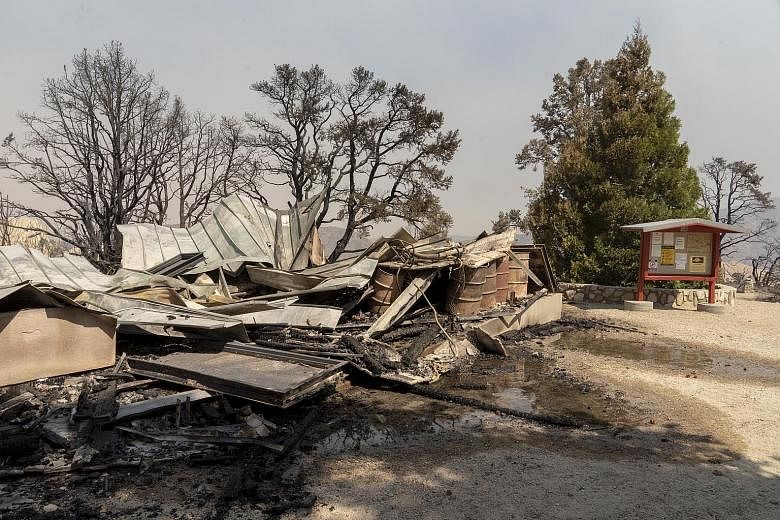LOS ANGELES • Deadly blazes raging across the western US have again destroyed thousands of homes nestled in forested areas this year - with months of the fire season still to come in a region perilously exposed to climate change.
With many insurers now refusing or charging exorbitant rates to cover at-risk houses, some home owners are questioning what the future holds for their exhausted communities.
Populations of settlements built on the forested margins of cities - officially known as the wildland-urban interface (WUI) - have exploded in recent decades, and now total some 50 million households.
One example is Paradise, a town bordering northern California's national forests, which was devastated by the state's deadliest modern-day fire in 2018.
Rebuilding from the inferno that claimed 86 lives had not even finished when it was threatened by another fire burning in a neighbouring town this month.
Despite the inherent risk of living in settlements like Paradise, the idea of evicting citizens "is the last solution residents want to resort to and policymakers want to resort to", said Dr Gregory Pierce, an urban planning professor at the University of California, Los Angeles. "But, for some communities, it's the only answer for survival."
So far this year, some 6,500 structures have been destroyed in California, said the state's Department of Forestry and Fire Protection, with massive devastation extending far into Oregon and Washington states up the Pacific coastline.
But WUI housing has grown exponentially due to the region's "housing affordability crisis", said Dr Pierce.
California's real estate is among the costliest in the United States, but it is still "cheaper to build new development in outlying areas than it is in core urban areas".
WUI housing boomed nationwide from 1990 to 2010, both in number of new homes (41 per cent) and land area used (33 per cent), said the US Forest Service.
There are many factors behind California's record fires. Besides overpopulation of the WUI, years of drought worsened by climate change have left endless hectares of excess, dry vegetation.
-
6,500
Number of structures that have been destroyed in California alone this year so far, according to the state's Department of Forestry and Fire Protection, with massive devastation extending far into Oregon and Washington states up the Pacific coastline.
For President Donald Trump, a climate change sceptic, poor forest management is the leading culprit.
One management tactic is to deliberately light "prescribed fires" that remove the fuel that feeds wildfires in a controlled way.
"Plans and practices like that can be very successful, but it's very, very difficult to do today because of the fact that there are a lot of people living out there," said retired California fire chief David Shew.
Another alternative would be to shift new housing stock to less flammable materials or remodel existing homes, he said.
The remodelling would be expensive, but could make the vital difference in surviving the next inferno, he added - and besides, there is no other easy option.
"We'll never have enough fire engines to park in every driveway."
AGENCE FRANCE-PRESSE

